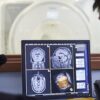Researchers at the University of California, Irvine have discovered a new brain connection that explains how early-life stress and adversity disrupt the brain’s reward circuit, offering a new therapeutic potential for treating mental illness. Several major disorders, such as depression, substance abuse, and excessive risk-taking, may be rooted in the dysfunction of this circuit, including depression, substance abuse, and excessive risk-taking.
In a recently published online article in Nature Communications, Dr. Tallie Baram, senior author and UCI Donald Bren Professor, and Dr. Matt Birnie, lead author, describe the cellular changes in the brain’s circuitry caused by childhood adversity.
“We characterize a stress-sensitive projection connecting basolateral amygdala (BLA) and nucleus accumbens (NAc) that co-expresses GABA and the stress-reactive neuropeptide corticotropin-releasing hormone (CRH),” according to the authors.
“We identify a crucial role for this projection in executing disrupted reward behaviors provoked by ELA: chemogenetic and optogenetic stimulation of the projection in control male mice suppresses several reward behaviors, recapitulating deficits resulting from ELA and demonstrating the pathway’s contributions to normal reward behaviors.”
“Exposure to severe or chronic stressors during sensitive periods in development can produce profound and often lasting changes to brain operations that can be detrimental to mental health.”


